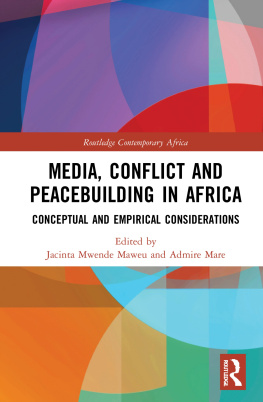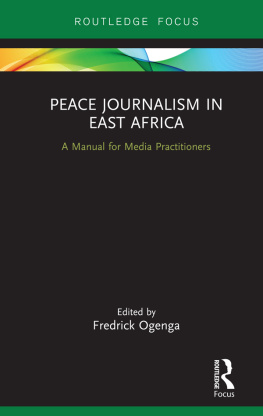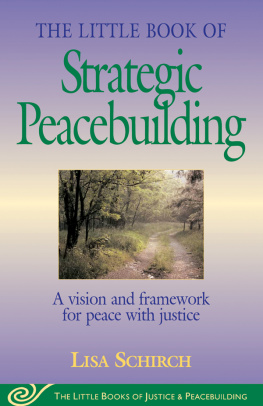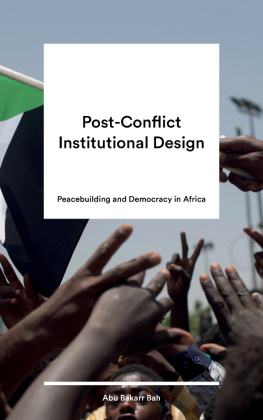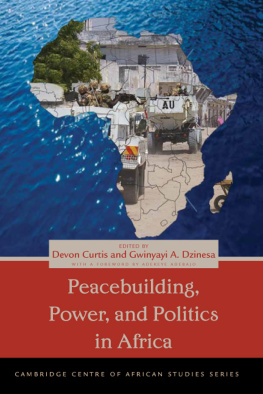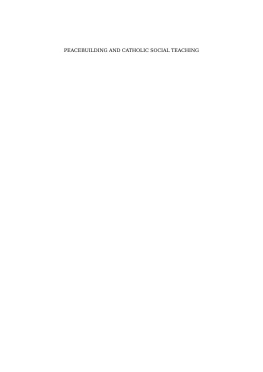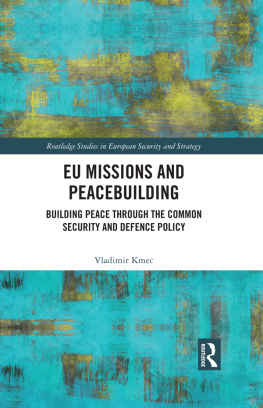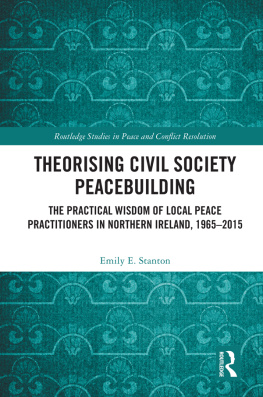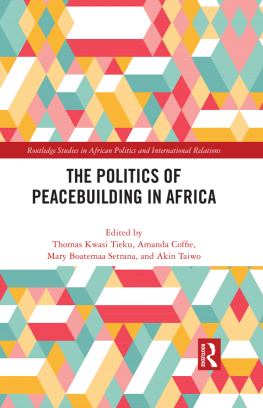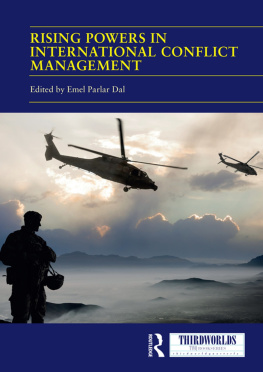Media, Conflict and Peacebuilding in Africa
This book explores the role and place of popular, traditional and digital media platforms in the mediatization, representation and performance of various conflicts and peacebuilding interventions in the African context.
The role of the media in conflict is often depicted as either good (as symbolized by peace journalism) or bad (as exemplified by war journalism), but this book moves beyond this binary to highlight the in-between role that the media often plays in times of conflict. The volume does not only focus on the relationship between mass media, conflict and peacebuilding processes but it broadens its scope by critically analysing the dynamic and emergent roles of popular and digital media platforms in a continent where the semi-literate and oral communities still rely heavily on popular communication platforms to get news and information. Whilst social media platforms have been hailed for their assumed democratic and digital dividends, this book does not only focus on these positive aspects but also shines a light on dark forms of participation which are fuelling racial, gender, ethnic, political and religious conflicts in highly polarized and stratified societies.
Highlighting the many ways in which traditional, digital and popular media can be used to both escalate conflicts and promote peacebuilding, this volume will be a useful resource for students, researchers and civil society groups interested in peace and conflict studies, journalism and media studies in different contexts within Africa.
Jacinta Maweu is a Senior Lecturer in Philosophy and Media Studies and an Associate Faculty Member at the Institute for Climate Change and Adaptation (ICCA) at the University of Nairobi, Kenya. Her key research interests revolve around media and democracy, media and human rights, media in peacebuilding, media ethics and the political economy of the media.
Admire Mare is an Associate Professor and Deputy Head of the Department of Communication at the Namibia University of Science and Technology, and a Senior Research Associate in the Department of Journalism, Film and Television at the University of Johannesburg. His research interests include digital media, digital journalism cultures and practices, media and democracy, youth studies, the intersection between technology and society, mediation of conflict and peacebuilding initiatives, innovation in African journalism, the role of artificial intelligence in newsrooms, sociology of African news and digital campaigns. He currently leads the international research project Social Media, Misinformation and Elections in Kenya and Zimbabwe (SoMeKeZi) funded by the Social Science Research Council (20192021).
Routledge Contemporary Africa
Death and the Textile Industry in Nigeria
Elisha P. Renne
Modern Representations of Sub-Saharan Africa
Edited by Lori Maguire, Susan Ball and S\xE9bastien Lefait
Narrating Human Rights in Africa
Eleni Coundouriotis
Higher Education and Policy for Creative Economies in Africa
Developing Creative Economies
Edited by Roberta Comunian, Brian J. Hracs and Lauren England
Decolonisation of Higher Education in Africa
Perspectives from Hybrid Knowledge Production
Edited by Emnet Tadesse Woldegiorgis, Irina Turner and Abraham Brahima
Everyday Crisis-Living in Contemporary Zimbabwe
Kirk Helliker, Sandra Bhatasara and Manase Kudzai Chiweshe
Media, Conflict and Peacebuilding in Africa
Conceptual and Empirical Considerations
Edited by Jacinta Maweu and Admire Mare
Gendered Violence and Human Rights in Black World Literature and Film
Edited by Naomi Nkealah & Obioma Nnaemeka
For more information about this series, please visit: https://www.routledge.com/Routledge-Contemporary-Africa/book-series/RCAFR
First published 2021
by Routledge
2 Park Square, Milton Park, Abingdon, Oxon, OX14 4RN
and by Routledge
52 Vanderbilt Avenue, New York, NY 10017
Routledge is an imprint of the Taylor & Francis Group, an informa business
2021 selection and editorial matter, Jacinta Maweu and Admire Mare; individual chapters, the contributors
The right of Jacinta Maweu and Admire Mare to be identified as the authors of the editorial material, and of the authors for their individual chapters, has been asserted in accordance with sections 77 and 78 of the Copyright, Designs and Patents Act 1988.
All rights reserved. No part of this book may be reprinted or reproduced or utilised in any form or by any electronic, mechanical, or other means, now known or hereafter invented, including photocopying and recording, or in any information storage or retrieval system, without permission in writing from the publishers.
Trademark notice: Product or corporate names may be trademarks or registered trademarks, and are used only for identification and explanation without intent to infringe.
British Library Cataloguing-in-Publication Data
A catalogue record for this book is available from the British Library
Library of Congress Cataloging-in-Publication Data
Names: Maweu, Jacinta Mwende, editor. | Mare, Admire, editor.
Title: Media, conflict and peacebuilding in Africa : conceptual and methodological considerations / edited by Jacinta Mwende Maweu and Admire Mare.
Other titles: Routledge contemporary Africa series.
Description: Abingdon, Oxon ; New York, NY : Routledge, 2021. |
Series: Routledge contemporary Africa | Includes bibliographical references and index.
Identifiers: LCCN 2020044548 (print) | LCCN 2020044549 (ebook) |
ISBN 9780367360283 (hardback) | ISBN 9780429344862 (ebook)
Subjects: LCSH: Mass media and peaceAfrica. | Mass media and warAfrica. | Peace-buildingAfrica.
Classification: LCC P96.P332 A34 2021 (print) |
LCC P96.P332 (ebook) | DDC 070.44930366096dc23
LC record available at https://lccn.loc.gov/2020044548
LC ebook record available at https://lccn.loc.gov/2020044549
ISBN: 978-0-367-36028-3 (hbk)
ISBN: 978-0-429-34486-2 (ebk)
Typeset in Baskerville
by codeMantra
1 Introduction. Changing the tide
Re-examining the interplay of media, conflict and peacebuilding in Africa
Jacinta Maweu and Admire Mare
This co-edited book volume brings together theoretical and empirical contributions from African scholars in the various disciplines within the field of media studies whose work demonstrates the centrality of the media in conflict and peacebuilding in Africa. Its uniqueness derives from the way in which it highlights the many ways through which traditional, digital and popular media can be used to escalate conflicts on the one hand and promote peacebuilding on the other in different contexts within Africa (Mare 2020b). The bulk of research on media and conflicts in Africa has focused on its destructive effects using notable case studies such as the 2007/2008 post-election violence in Kenya, the Sierra Leone civil war, the Boko Haram insurgency in Nigeria, the Gukurahundi massacre in Zimbabwe in the 80s and the 1994 Rwanda genocide. There is, however, a growing recognition of the crucial role the media can play in helping provoke conflict as well as promote peace and conflict resolution, hence the justification for this book, which interrogates how the media plays this intercalary role. Whilst most of the case studies contained in this volume focus on the negative role of media in conflict and peacebuilding, we are not oblivious of the fact that there is significant research (Bratic and Schirch 2007; Gilboa 2010; Laker 2019) on the positive role of the media in peacebuilding and conflict resolution across the globe. We also acknowledge that some media organizations play both the conflict escalation and peacebuilding roles concurrently. It is these subtle nuances that avoid the trap of being caught up in the dogma of dichotomies that this volume seeks to tease out using empirical case studies.

